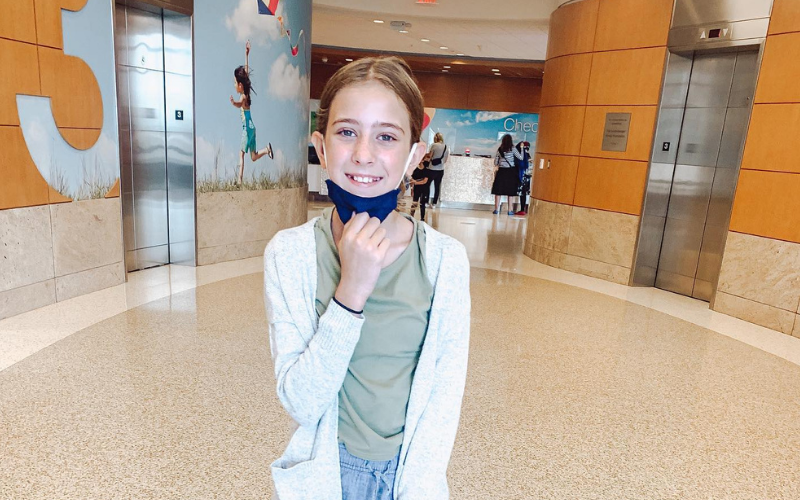
12-year neuroblastoma survivor Lucy.
By: Shannon OConnor
Dr. Janice Withycombe, an ALSF-funded research nurse at Clemson University and Prisma Health, believes that the long-term side effects of pediatric cancer treatment can best be understood not by talking to the parents of a child, but by talking to the child directly to hear their experience.
Childhood cancer treatments — especially chemotherapy, radiation and surgery — come with a myriad of immediate, short-term and lifelong side effects. Side effects during treatment can make the harsh months of chemotherapy or radiation a challenge to endure. In the years after treatment, they can impact education, psycho-social health, fertility and overall health.
Dr. Withycombe believes that a crucial step in finding better treatments and cures is researching how treatments affect kids, in their own words.
In 2013, Dr. Withycombe received her Nurse Researcher Grant from Alex’s Lemonade Stand Foundation (ALSF) that kickstarted her work on evaluating the literacy demand of self-reporting during childhood cancer therapy. Before this, she was a pediatric research nurse working on Children’s Oncology Group (COG) studies. Through COG, she met Dr. Pamela Hinds, who introduced her to an emerging area of research: Patient Reported Outcomes (PRO).
This concept is relatively new – the PRO Common Terminology Criteria for Adverse Events (PRO-CTCAE) is a compilation of individual questions for clinicians to utilize when evaluating cancer patients for subjective symptoms experienced during treatment. The PRO-CTCAE allows adult patients to self-report their symptoms. Most recently, Dr. Hinds and Dr. Bryce Reeve spearheaded the development of the pediatric version for children and adolescents between the ages of 7 and 17: the Pediatric-PRO-CTCAE. Dr. Withycombe joined their efforts to fully validate the Pediatric PRO-CTCAE for use in pediatric oncology.
As a result of cancer and treatment, patients may experience negative symptoms, such as fatigue, pain, nausea, and anxiety. These are referred to in Dr. Withycombe’s field as “symptom adverse events.” Reporting of symptom adverse events using the National Cancer Institute’s CTCAE system is required for anyone participating in a cancer clinical trial. When the cancer patient is a child, they often don’t get an opportunity to weigh in. The Pediatric PRO-CTCAE instrument library can be utilized to collect the child’s self-report which then assists clinicians with appropriate grading of adverse events.
“Traditionally, the reporting of these events is completed by the clinicians caring for the child, sometimes with input from the parents or caregivers,” said Dr. Withycombe. “As many symptom-adverse events are subjective in nature – and since the child is the one experiencing the adverse effects – it stands to reason that the child should be the one giving the answers.”
And kids are willing to share.
Dr. Withycombe’s research found that when asking specific questions, particularly about pain, sadness and anxiety, children were able and willing to give more detailed responses than to a general query like “How are you today?”
In order to get the most accurate responses, the questions must be tailored to kids as much as possible. Parent and clinician reports are not direct replacements to a child’s report. It also doesn’t matter how small the reported symptoms are. Even when a child’s symptoms are “lower grade”, they add up and can cause a cumulative symptom burden that decreases their quality of life.
In Dr. Withycombe's research, she has validated that children as young as 7 years of age can self-report using the developed Ped-PRO-CTCAE questions.
“A report of this nature holds value in assisting clinicians with recognizing on-going symptoms so that interventions can be implemented to reduce symptom distress,” Dr. Withycombe said.
Ultimately, the goal is to use the Pediatric PRO-CTCAE to improve symptom adverse event reporting in pediatric clinical trials. By taking a child’s direct report and evaluating it against the trial to understand how safe or harmful it is, clinicians can see what may need to change.
“This information is critical to make sure we find the most effective and safest treatments for children,” said Dr. Withycombe.
Dr. Withycombe’s work is ongoing to explore the possibility of using reported symptoms to predict symptom experience during treatment. She and her team are also exploring ways to extend the Ped-PRO-CTCAE to even younger children.
“The funding from ALSF allowed me to conduct a multi-site study to examine the association between a child’s literacy level, age and ability to self-report symptoms,” shared Dr. Withycombe. “It was instrumental in advancing my research career, and the care of children with cancer!”
Since inception, ALSF has been dedicated to funding lifesaving and innovative childhood cancer research that will lead to cures. We make grants in three core areas to achieve this: early career research, accelerator programs and quality of life and care. ALSF has funded more than 1,000 critical research projects breaking ground for new treatments and cures for childhood cancer. Learn more about the grants we create and the research we’re funding here.

